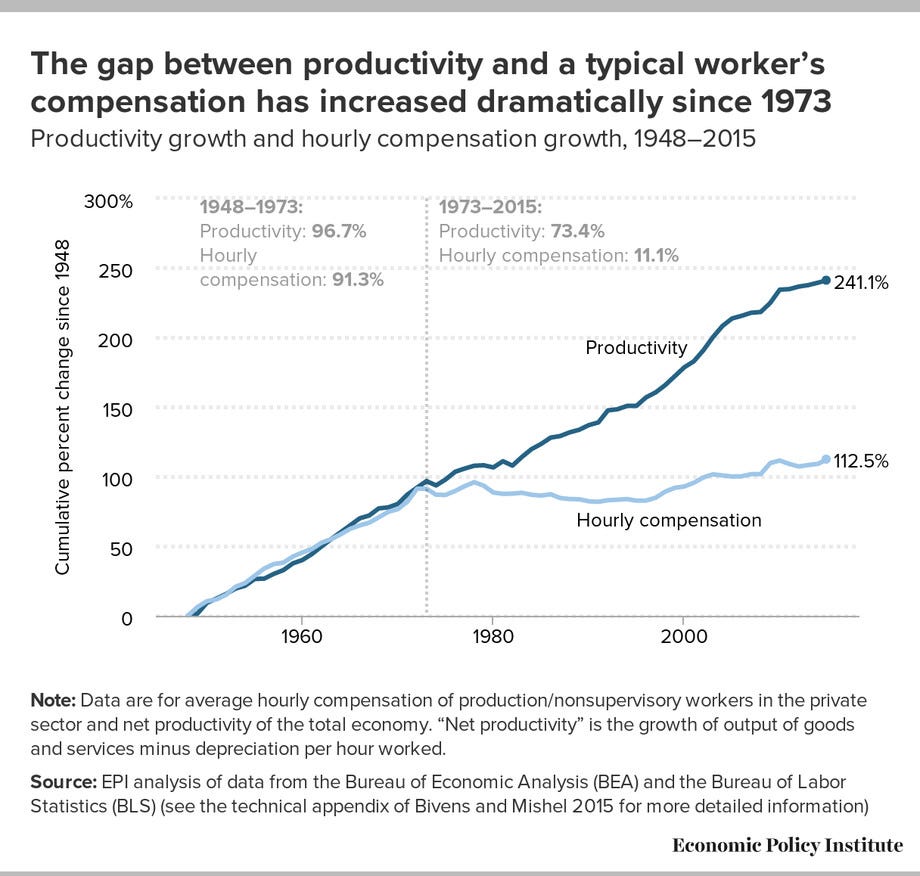The Jetsons was a Space Age cartoon sitcom set in the year 2062. It premiered in 1962 playfully imagining all the futuristic gizmos and gadgets of an everyman 100 years in the future. In the show, Space Dad George Jetson works just two days a week— for one hour each day—in the office — supporting his family of 4, affording a robot maid and paying a mortgage on a flying duplex in Orbit City.
Catching a re-run late one night, I had a revelation and a disappointment -
Revelation — George Jetson was born July 31, 2022 making him older than my newborn son —The Future is Near!
Disappointment — If the future is so close, why isn’t society well on its way towards 2 hour work weeks which can support middle class families?
George Jetson’s Career
George works for Spacely Sprockets as a “digital index operator.” This involves him pushing buttons to maintain an atomic supercomputer named RUDI (short for “Referential Universal Digital Indexer”).
In essence, George’s job is to prune and manage datasets used to feed an AI supercomputer. He then monitors and reports the workloads being performed by RUDI. This sounds just like a job which may exist in the next 10-15 years. Chief AI Officer and his merry band of digital index operators.
In this universe, George’s output in just 1 hour of work is equal to 20x the output of today’s worker because RUDI handles the brunt of the “work”. Also in this universe, George gets PAID 20x the wages of today’s worker because his compensation matches his productivity.
Labor Productivity Vs Compensation
Must be nice, George. Must. be. nice. While it feels like we’re inching closer to a world with AI supercomputers and jobs to manage the training data inputs, most fulltime jobs are still 40 hours per week minimum.
It’s easy to see why the creators of the The Jetsons would assume work weeks continue getting shorter and compensation rise over time though.
In the 1st half of the 20th century, productivity and hourly compensation were still HIGHLY correlated. In a linear extrapolation 100 years into the future, people would only need to work 2 hours per week to earn a strong and stable middle class wage.
Yet, it wasn’t meant to be. Over the past 50 years, the amount labor has been compensated for their productivity has lagged considerably. This is known as the Productivity-Compensation Gap

Even normalizing for inflation and innovation, all high skill white collar jobs actually trail their early-to-mid 20th century equivalent labor rates.
So why did this gap emerge and how do workers reverse course to reclaim the wage premium for productivity? Those are questions for another day.
Interested in being on the Trader Dads Podcast in 2024? Shoot me an email! I’d love to have subscribers on to sit for a discussion
TRADERDADS MAILBAG
Thoughts? Questions? Comments?
Reach out! Maybe I’ll do a full post on the topic or as a Q&A
traderdads@substack.com








